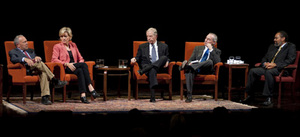
By Andrew Cohen
With the presidential election fast approaching, four political heavyweights—two on each side of the partisan fence—revealed strong and wide-ranging views on Barack Obama’s first term last Friday night in San Francisco. Former Michigan Governor and Current TV host Jennifer Granholm, political strategist Dan Schnur, former U.S. Senator and California Governor Pete Wilson ’62, and former U.S. Secretary of Labor Robert Reich took center stage at the Herbst Theatre, where a packed crowd gathered for “The Obama Report Card.”
The event, moderated by Berkeley Law Dean Christopher Edley, Jr., was the first in a series of events celebrating the law school’s 100-year anniversary. Edley set the tone for a passionate but respectful conversation by first asking Republicans Schnur and Wilson to identify something Obama did well in his first term—and Democrats Granholm and Reich to identify something he did not. Schnur gave the President “tremendous credit” for working to improve K-12 public education and for his tributes to war veterans. Reich lamented Obama’s “naïve” view of Congress.
“I think Barack Obama came in believing politics was a more rational process of people coming to work through agreements and compromise,” said Reich, now the Chancellor’s Professor of Public Policy at UC Berkeley. Reich said Republicans in Congress “weren’t prepared to negotiate,” and Obama “could have led from much stronger positions” on healthcare and Wall Street regulations.
Granholm, a UC Berkeley Distinguished Practitioner of Law and Public Policy, argued that Obama inherited a woeful economy from George W. Bush. She said his domestic agenda has been routinely hampered by House Republicans who have “signed pledges not to cooperate with Obama.” Reich agreed, saying that too many Republican Congressmen “are ideologues, not legislators.”
Wilson countered by noting that Obama had a Democratic-majority House and Senate during his first two years in office: “The people behind his candidacy thought he’d take a stronger role in developing legislation.” Wilson added that when Republicans regained control of the House in 2010, it included members who “thought they’d been dissed,” after Obama “jammed through” his 2009 economic stimulus bill.
Reich argued that a second Obama term would help protect the middle class, which he said “has lost its purchasing power because of how much money is concentrated at the top.” Over the past century, he said, the richest one percent of Americans pocketed more than 20 percent of U.S. wealth in the years 1928 and 2007—just before the two largest stock market crashes on record.
Schnur, the national director of communications for John McCain’s 2000 presidential bid, received marked applause for his incisive assessment of today’s political climate. Now Director of the University of Southern California’s Unruh Institute of Politics and an Adjunct Instructor at UC Berkeley’s Institute of Governmental Studies, Schnur described Washington as “much nastier” and “more bitter” than ever before.
Schnur also decried the “alarming trend” of people increasingly choosing media outlets that “never challenge us and only affirm what we already believe.” He invoked former President Bill Clinton as a model for achieving compromise and bipartisan support, noting that when discussing abortion, Clinton said he wanted to make it “safe, legal, and rare.” Schnur urged Obama to do the same.
Reich and Granholm, each a member of Obama’s 2008 presidential transition team, hailed the President’s foreign policy record. Granholm said “our country’s position in the world has improved,” while Reich praised Obama’s handling of the Arab Spring and said he has worked “incredibly well” with Secretary of State Hillary Clinton and Secretary of Defense Leon Panetta.
Unmoved by those assessments, Wilson said “I’d have to give him an F.” He called Obama’s decision to give an unnamed deadline for departing Afghanistan “a very dangerous thing to do.” He questioned why Obama was “mute” when Iranians protested President Mahmoud Ahmadinejad and why he has not done more to oust Syrian President Bashar al-Assad. Wilson called the president’s approach a “policy of disengagement” that features “timidity and indecisiveness.”
By contrast, Schnur said Obama “will be first Democratic President since JFK where foreign policy would be a net plus.” Schnur did express concerns about Obama’s position with Israel, however, namely his recent decision not to meet with Israeli Prime Minister Benjamin Netanyahu and the impact of that on Iran’s nuclear intentions.
Schnur criticized both Obama and Republican challenger Mitt Romney for their stance on China, saying “it concerns me to see two smart men try to show who can be tougher.” He noted that Obama has filed five complaints about China to the World Trade Organization in his first term, including one the day before a campaign trip to Ohio—the election’s most heated battleground state.
On domestic policy, Granholm praised Obama’s support of same-sex marriage and a woman’s right to choose, “particularly in the face of 26 states adopting 90 pieces of legislation that would restrict that right.” When Wilson asked why Obama did not openly support same-sex marriage until this year, Granholm asked if he was cynical about Obama’s “evolving” views. “No. Skeptical,” Wilson said.
Toward the end, Schnur urged the capacity crowd to remain open-minded and intellectually curious between now and Election Day: “I tell my right-leaning students to watch Rachel Maddow and my left-leaning students to read David Brooks and George Will. It’s important to listen to people who don’t agree with everything you say.”